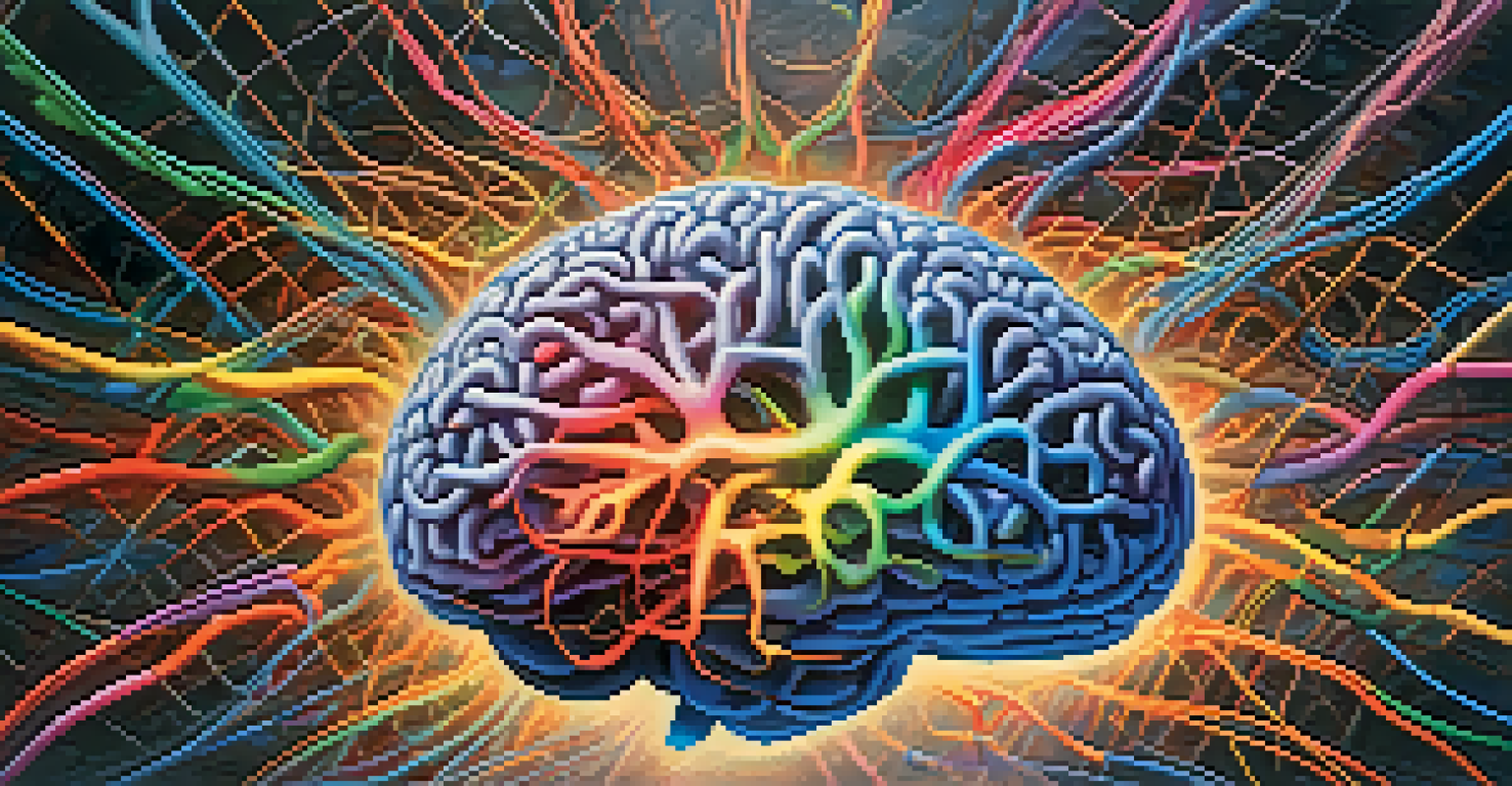Investigating Ayahuasca's Effects on Cognitive Functioning

Understanding Ayahuasca and Its Ingredients
Ayahuasca is a traditional Amazonian brew made from the Banisteriopsis caapi vine and the Psychotria viridis leaf. This combination creates a powerful psychoactive potion that has been used for centuries in spiritual and healing practices. The active components, particularly DMT (dimethyltryptamine), are known for their intense hallucinogenic effects. Many people seek out ayahuasca experiences for personal growth, mental clarity, and emotional healing.
The mind is like a parachute. It doesn’t work if it isn’t open.
The brew is often consumed in a ceremonial setting, guided by a shaman or experienced facilitator. This context adds layers of meaning and intention, which can influence the overall experience. Participants report a range of effects, from profound insights to challenging emotional confrontations, making each journey unique. Understanding what ayahuasca is and how it works lays the foundation for exploring its potential impact on cognitive functioning.
As interest in ayahuasca grows, researchers are beginning to investigate its effects on the brain. The blend of psychoactive ingredients may alter neural pathways, potentially leading to changes in perception, mood, and cognition. But how exactly does this brew influence cognitive processes? Let's delve deeper into the relationship between ayahuasca and cognitive functioning.
Cognitive Functioning: What Does It Entail?
Cognitive functioning refers to a range of mental processes, including memory, attention, problem-solving, and decision-making. It's the brain's way of processing information and is crucial for everyday tasks, from remembering where you left your keys to planning your day. Enhancing cognitive functioning can lead to improved performance in work, education, and even personal relationships.

Factors that affect cognitive functioning include age, health, lifestyle, and, intriguingly, psychoactive substances. While some drugs can impair cognition, others may offer therapeutic benefits. Understanding how ayahuasca interacts with these cognitive processes is essential for evaluating its potential benefits and risks. This is where the research begins to get exciting, as scientists seek to uncover the nuances of this relationship.
Ayahuasca and Cognitive Benefits
Research suggests that ayahuasca may enhance cognitive flexibility, emotional processing, and creativity.
In the context of ayahuasca, researchers are particularly interested in how it may enhance creativity, emotional regulation, and introspection. Anecdotal evidence suggests that many users experience heightened awareness and improved problem-solving abilities after their journeys. But can these effects be measured and analyzed scientifically? Let's take a look at some of the current studies.
Current Research on Ayahuasca and Cognitive Effects
Recent studies have begun to explore the cognitive effects of ayahuasca, with some suggesting potential benefits such as improved memory and enhanced emotional processing. For instance, a study published in 'Psychopharmacology' found that participants who consumed ayahuasca showed increased cognitive flexibility, allowing them to adapt their thinking in response to new information. This flexibility is a vital component of effective problem-solving and creativity.
The greatest discovery of my generation is that a human being can alter his life by altering his attitudes.
Additionally, researchers have noted that ayahuasca may help reduce symptoms of anxiety and depression, which can indirectly support cognitive functioning. By addressing emotional barriers, users may find it easier to focus and process information. This interplay between emotional health and cognitive performance is a growing area of interest within the field of psychology.
However, it's crucial to approach these findings with caution. While some studies highlight positive outcomes, others raise questions about the potential risks associated with ayahuasca use. The variability in individual experiences means that further research is needed to draw definitive conclusions about its cognitive effects.
Neurobiology of Ayahuasca: How It Affects the Brain
Ayahuasca's influence on the brain is a fascinating topic that intertwines neuroscience with traditional healing practices. The active ingredient, DMT, interacts with serotonin receptors, particularly the 5-HT2A receptor, which plays a role in mood and cognition. This interaction may lead to altered states of consciousness, offering users unique insights and perspectives.
Moreover, ayahuasca appears to promote neurogenesis, the process of forming new neurons, particularly in the hippocampus, a region vital for memory and learning. This effect could contribute to some of the cognitive benefits reported by users, such as enhanced memory retention and improved emotional regulation. By fostering a healthier brain environment, ayahuasca may support overall cognitive functioning in the long run.
Emotional Insights Through Ayahuasca
Participants often report profound emotional insights and healing, which can improve mental clarity and decision-making.
Despite these intriguing findings, more research is needed to fully understand the neurobiological mechanisms at play. The complexity of brain function means that the effects of ayahuasca can vary widely among individuals. Therefore, ongoing studies are crucial to unravel the intricate relationship between ayahuasca, neurobiology, and cognitive functioning.
Ayahuasca's Impact on Emotional Processing
Emotional processing is a key aspect of cognitive functioning, and ayahuasca is often reported to facilitate profound emotional insights. Many users describe experiences that allow them to confront and integrate past traumas, leading to emotional healing and improved mental clarity. This process can enhance the ability to manage emotions, which is crucial for cognitive tasks such as decision-making and problem-solving.
Research suggests that ayahuasca may help regulate emotions by promoting a greater sense of empathy and connectedness. This sense of connection can lead to a more positive outlook on life, which in turn can enhance cognitive functioning. For instance, individuals who feel more emotionally balanced may find it easier to focus and engage with complex tasks.
However, it's important to acknowledge that the emotional journey with ayahuasca can also be challenging. Some participants face difficult emotions during their experiences, which may temporarily hinder cognitive function. The dual nature of these experiences highlights the need for careful consideration of individual readiness and support when engaging with ayahuasca.
Potential Risks and Considerations of Ayahuasca Use
While ayahuasca offers potential cognitive benefits, it's essential to consider the associated risks. The intensity of the experience can be overwhelming for some, leading to anxiety, paranoia, or even psychotic episodes. Individuals with a history of mental health issues should approach ayahuasca with caution, ideally seeking guidance from professionals.
Moreover, the physical effects of ayahuasca, such as nausea and vomiting, can also impact cognitive functioning during the experience. Although these reactions are often described as purging, they can be distressing and distract from the intended cognitive benefits. It's crucial for participants to be well-prepared and informed about what to expect before embarking on this journey.
Risks of Ayahuasca Use
While ayahuasca offers potential benefits, it also carries risks such as overwhelming experiences and physical side effects.
In addition, the legal status of ayahuasca varies by location, which can complicate access and safety. Understanding the local regulations and ensuring that the experience takes place in a safe environment are key factors for anyone considering ayahuasca. Balancing the potential benefits with these risks is a critical step in making informed decisions about its use.
Future Directions: Research and Ayahuasca's Place in Therapy
As interest in ayahuasca continues to grow, the future of research in this area looks promising. Scientists are increasingly focusing on the therapeutic potential of ayahuasca for various mental health conditions, such as PTSD, depression, and anxiety. By conducting rigorous studies, researchers aim to provide a clearer understanding of how ayahuasca can fit into contemporary therapeutic practices.
There is also a growing movement toward integrating traditional practices with modern psychology. By recognizing the value of indigenous knowledge, therapists may find new ways to support their clients' mental health journeys. This fusion of ancient wisdom and modern science could pave the way for innovative treatments that harness the cognitive and emotional benefits of ayahuasca.

Ultimately, the future of ayahuasca research holds the potential for significant breakthroughs in understanding human cognition and emotional health. As we unravel the complexities of ayahuasca's effects on the brain, we may discover new pathways to healing and personal growth that resonate with many people's experiences.